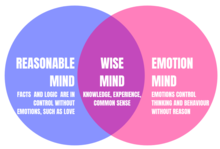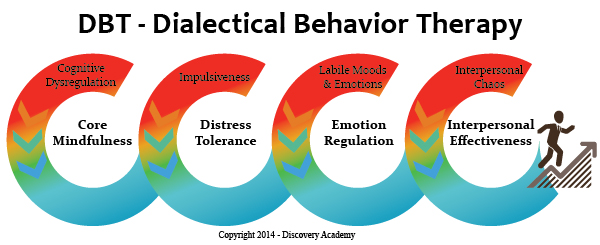Navigating Emotional Wellness: Dive into DBT London's Method
Navigating Emotional Wellness: Dive into DBT London's Method
Blog Article
Empowering People Through Efficient Dialectical Behavior Therapy (DBT) Solutions: Building Stronger Mental Wellness Foundations
In the realm of mental health and wellness and wellness, the relevance of empowering people through efficient Dialectical Practices Treatment (DBT) solutions can not be overemphasized. By focusing on the core concepts of DBT, such as enhancing emotional regulation skills, boosting interpersonal efficiency, constructing distress tolerance techniques, and cultivating mindfulness techniques, individuals can start a journey in the direction of building stronger psychological health foundations. The impact of DBT surpasses mere symptom monitoring; it uses an alternative method that gears up individuals with the tools needed to browse life's challenges with resilience and self-awareness. As we discover the transformative potential of DBT in equipping people to lead more meeting lives, the path to improved psychological wellness and well-being becomes an engaging narrative that beckons exploration.
Comprehending the Core Concepts of DBT


One core principle of DBT is recognition. One more basic aspect is dialectics, which shows individuals to watch situations from numerous viewpoints and locate the synthesis between conflicting thoughts or feelings.
Moreover, the concept of dialectical abstaining is main to DBT. This concept encourages people to avoid suicidal actions while likewise approving themselves. By comprehending and incorporating these core concepts, therapists can efficiently apply DBT strategies and support people in their trip towards psychological policy and mental wellness.
Enhancing Emotional Regulation Abilities
Establishing efficiency in managing emotions is a basic aspect of fostering psychological health and social performance - DBT London. Enhancing emotional guideline skills is a core element of Dialectical Behaviour Treatment (DBT) that outfits individuals with the tools to navigate intense emotions in a constructive and healthy fashion. Through DBT, people find out to identify, recognize, and regulate their emotions, resulting in improved psychological wellness end results
DBT emphasizes the value of mindfulness, which entails being existing in the minute without judgment. This method allows individuals to observe their emotions without becoming overwhelmed by them, boosting their capacity to react effectively as opposed to respond impulsively. By cultivating mindfulness, people can create a higher sense of self-awareness and psychological control.
Moreover, DBT educates useful skills such as distress tolerance and feeling guideline strategies to aid individuals manage challenging feelings. By learning these skills, people can lower impulsive actions, improve decision-making, and enhance their connections with others. Ultimately, improving emotional regulation skills via DBT equips individuals to lead even more meeting and well balanced lives.

Improving Interpersonal Efficiency
Having developed a strong structure in psychological law skills within the structure of Dialectical Practices Treatment (DBT), the focus now shifts towards boosting social efficiency. Improving social efficiency is a critical element of DBT as it gears up people with the needed abilities to navigate social communications, interact efficiently, set borders, and develop healthier relationships.
In DBT, interpersonal effectiveness skills are shown through components that concentrate on areas such as assertiveness, reliable communication, and interpersonal analytic. By finding out these abilities, people can enhance their capacity to express their demands and needs, preserve self-worth, and build more powerful links with others.
Exercising mindfulness is an essential part of enhancing interpersonal efficiency within the DBT structure. Mindfulness allows individuals click resources to be present in their communications, pay attention actively, and respond attentively rather than respond impulsively. By integrating mindfulness right into their day-to-days live, people can cultivate better self-awareness and psychological guideline, which are essential for effective interpersonal communications.
Building Distress Resistance Methods
Exploring reliable techniques for taking care of emotional distress is essential for people looking for to boost their coping abilities and durability. Structure distress resistance strategies is a website here vital aspect of Dialectical Practices Therapy (DBT) that empowers individuals to browse tough feelings without coming to be overwhelmed.
Moreover, mindfulness techniques play a substantial role in structure distress resistance. Mindfulness urges individuals to remain existing in the minute without judgment, allowing them to observe their ideas and emotions without responding impulsively. This awareness allows people to endure distress much more properly and create a higher sense of control over their actions.
In addition to these methods, producing an individualized distress tolerance plan with the assistance of an experienced specialist can provide individuals with a customized technique to taking care of emotional distress - DBT London. By incorporating these methods into daily life, individuals can enhance their psychological health and wellness foundations and improve their overall wellness

Cultivating Mindfulness Practices
To grow their distress resistance methods better, individuals can focus on growing mindfulness practices as a corresponding strategy within the framework of Dialectical Behavior Treatment (DBT) Mindfulness, a vital component of DBT, involves taking notice of the present moment without judgment. By promoting mindfulness, people can improve their understanding of ideas, emotions, and bodily experiences, promoting a deeper understanding of themselves and their experiences.
Mindfulness practices in DBT include methods such as mindful breathing, body scans, and observing ideas without attachment. These methods motivate individuals to establish a Recommended Site non-reactive stance in the direction of their internal experiences, allowing them to react to difficult scenarios with better clearness and composure. By including mindfulness right into daily regimens, people can learn to control their feelings better, minimize spontaneous actions, and cultivate a feeling of inner peace.
With cultivating mindfulness practices, people undergoing DBT can construct a strong foundation for taking care of anxiety, improving relationships, and improving general health. By incorporating mindfulness into their therapeutic trip, individuals can establish valuable skills that equip them to browse life's difficulties with resilience and self-awareness.
Verdict
In conclusion, reliable Dialectical Behaviour Treatment (DBT) services play an important role in encouraging people to develop more powerful mental wellness structures. By understanding the core principles of DBT, boosting emotional guideline skills, boosting interpersonal effectiveness, building distress tolerance techniques, and cultivating mindfulness practices, individuals are furnished with the needed devices to browse their feelings, relationships, and challenges in an extra resistant and adaptive fashion. DBT solutions provide a comprehensive strategy to promoting psychological well-being and equipping individuals to lead meeting lives.
By concentrating on the core principles of DBT, such as enhancing psychological guideline skills, improving interpersonal performance, constructing distress tolerance strategies, and growing mindfulness practices, people can embark on a trip towards structure more powerful psychological wellness foundations. Enhancing psychological regulation skills is a core component of Dialectical Behaviour Treatment (DBT) that outfits individuals with the tools to browse intense emotions in a healthy and balanced and constructive fashion.Additionally, DBT instructs practical abilities such as distress tolerance and emotion regulation methods to aid individuals manage difficult feelings.To deepen their distress tolerance methods further, people can concentrate on cultivating mindfulness practices as a complementary technique within the structure of Dialectical Behavior Therapy (DBT) By recognizing the core concepts of DBT, enhancing psychological regulation skills, boosting social efficiency, building distress tolerance methods, and growing mindfulness methods, people are equipped with the essential tools to browse their feelings, partnerships, and challenges in a more resilient and flexible fashion.
Report this page